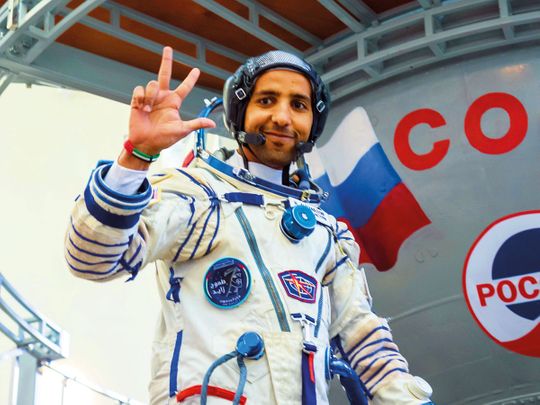
Dubai: Many UAE residents woke up in the morning to a change in their service provider names. In a nod to UAE's first ever space mission, du and Etisalat show "1stUAEAstro" in the service provider info bar - left or right top on most smartphones.
Journey and dates
September 25, Wednesday is D-day for the historic launch of UAE astronaut Hazzaa AlMansoori to space. He will be accompanied by Russian commander Oleg Skripochka and Nasa astronaut Jessica Meir on the journey to the International Space Station.
Skripochka and Meir are set to remain on the ISS until the spring of 2020 while Mansoori's return to Earth is planned on October 3.
We are covering the launch of the first-ever UAE astronaut to the ISS live from Baikonur Cosmodrome in Kazakhstan - so bookmark the Gulf News page or download the GN app to stay updated.
Reserve Emirati astronaut Sultan Al Neyadi will also be at Baikonur with Russian commander Sergey Ryzhikov and Thomas Marshburn from NASA.
UAE in space
The UAE will become the 19th visiting country on board the space station, marking a historic moment in the country's space journey. Mansoori himself will be the 240th visitor to the space station.
Mansoori, who will spend eight days on the ISS, will be the first Emirati astronaut and the first Arab on the orbiting laboratory, but not the first Muslim.
Fact sheet
- The ISS is a space station in low Earth orbit, with its first component launched in 1998.
- The ISS programme is a joint project between five ve participating space agencies -- NASA (United States), Roscosmos (Russia), JAXA (Japan), ESA (Europe), and CSA (Canada).
- The space station's first long-term residents arrived on 2nd November 2000. It serves as a microgravity and space environment research laboratory where crew members can conduct experiments in biology, human biology, physics, astronomy, and meteorology, among other fields. The giant floating laboratory orbits the Earth at an average altitude of 400 kilometres.
- It travels at an average speed of 27,724 kilometres per hour, and completes 15.54 orbits per day (93 minutes per orbit).
- At a cost of US$160 billion [Dh587 billion approximately], the ISS is considered as the most expensive object ever built, featuring solar arrays that generate electricity.
- The atmosphere on board the ISS is similar to that of Earth, utilising systems that generate oxygen - via electrolysis of water - to provide a safe and comfortable earth-like atmosphere for crew members.
- The ISS has been visited by astronauts, cosmonauts and space tourists from 18 different nations. UAE is set to become the 19th.
- Inputs from WAM, AFP








